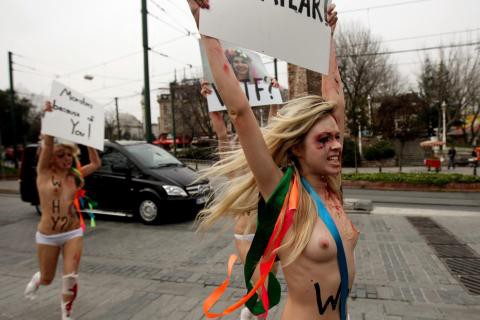Kitty Green’s short films have screened at film festivals internationally. After graduating film school, Green worked for ABC in Australia producing content for national broadcast. Green spent the last year in her mother’s native Ukraine filming with the topless protest movement FEMEN. Her abduction by the KGB made headlines internationally.
Ukraine is Not a Brothel is a portrait of Ukraine’s topless feminist sensation, FEMEN, which has stirred up a press frenzy across Europe. Outraged by the world’s image of Ukrainian women as either brides for sale or commodities of sex tourism, FEMEN bare their breasts in protest. Ukraine Is Not A Brothel offers an intimate glimpse inside the world’s most provocative feminist organization. A movement that began in the snow-filled streets of a corrupt, post-Soviet Ukraine, FEMEN’s naked war against patriarchy is gaining momentum internationally. Before they can take the world by storm, however, these bold and beautiful women must first confront the contradictory forces powering their own “titillating” feminist organisation. (Press materials)
Ukraine Is Not A Brothel will debut at SXSW on March 8.
Please give us your description of the film.
Ukraine Is Not A Brothel is a feature documentary about the topless Ukrainian feminist movement FEMEN. The film follows these provocative activists as they wage a war against patriarchy in a corrupt Ukraine.
What made you write this story?
I came across a discarded tabloid newspaper article about FEMEN on the floor of a Melbourne train. The headline read “Topless Ukrainian Feminist Movement” and featured a photograph of a scantily-clad blonde girl holding a sign that read “Ukraine Is Not A Brothel.” I was naturally intrigued. While traveling in my grandmother’s native Ukraine, I filmed my first FEMEN protest in the Maydan in Kiev. I was immediately hooked and stayed with the girls in their crumbling Soviet apartment for fourteen months in order to complete the documentary.
What was the biggest challenge in making the film?
I was arrested eight times during the making of the documentary. The Ukrainian police didn’t scare me, as they were never sure what to do with an Australian citizen. During a trip to the neighboring Belarus, however, I was abducted by the KGB while shooting a FEMEN protest. I was detained for over 12 hours in a dark, empty room and was subsequently deported to Lithuania. I was terrified as I’d heard terrible stories about journalists going missing in that country and had no idea what these men were capable of. I receive a birthday card from my KGB translator each year reminding me never to return to Belarus.
What advice do you have for other female directors?
Stick with the women. It is true that the film industry can be a bit of a boys club, and as a young female, you can’t just “hang out” with the boys freely. My advice is to seek out the strongest women in the industry (anyway you can) as the most powerful women will often go out of their way to help you. I’ve had some really inspiring women support my film. It wouldn’t have come this far without their help and guidance.
What’s the biggest misconception about you and your work?
There are two big misconceptions about my film. The first is that it is FEMEN propaganda. The second is that it seeks only to discredit FEMEN. Neither of them are true. My film is an intimate and honest look at the lives of the women that make up this controversial and provocative movement.
Name your favorite women directed film and why.
My favourite film is Chantal Akerman’s Jeanne Dielman, 23 Quai du Commerce, 1080 Bruxelles. It is the film that inspired me to make films. There is nothing else quite like it. There is so much beauty and truth in its simplicity and it speaks volumes about traditional gender roles.







